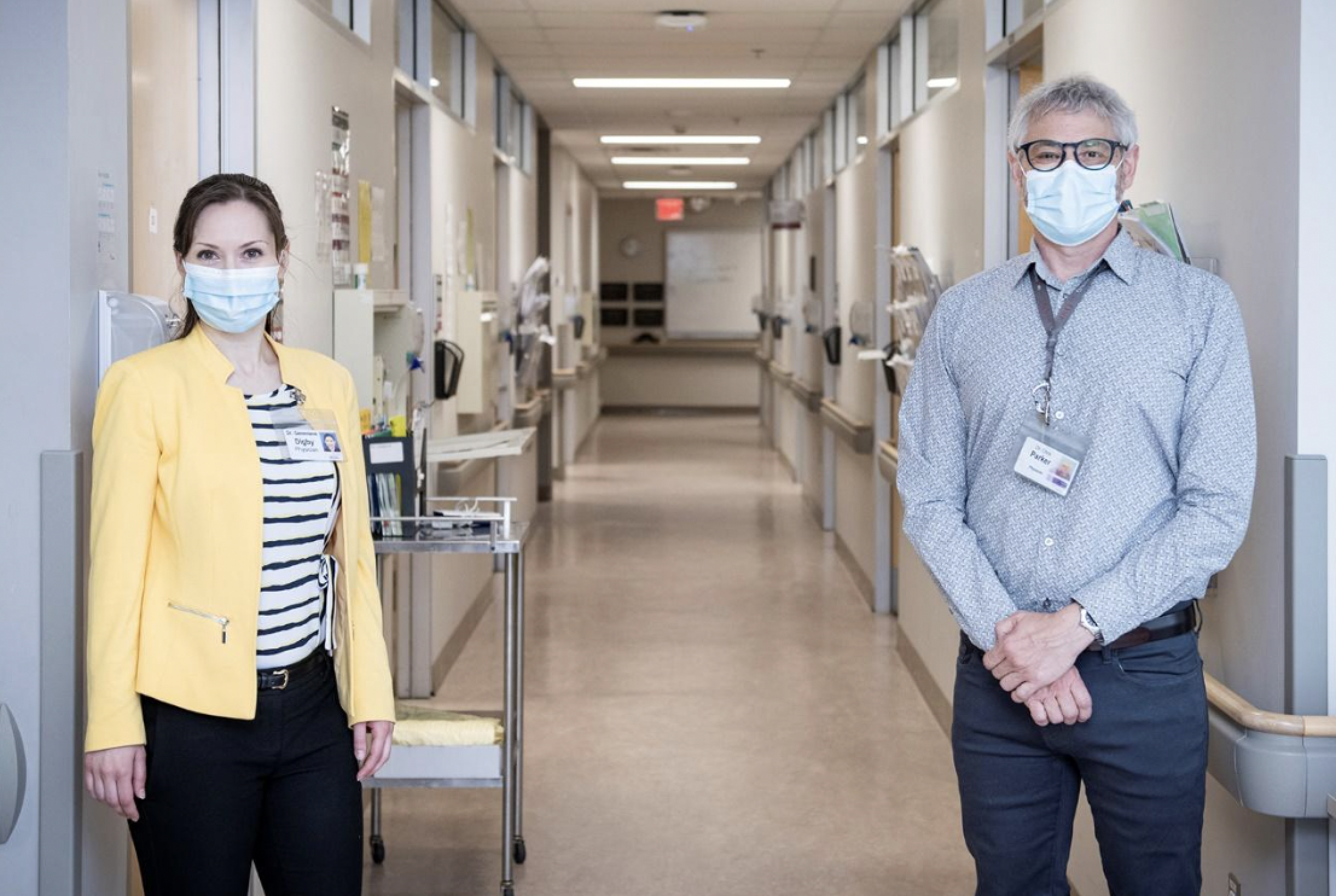Lung Cancer Innovation Challenge
In early 2021, Merck Canada, in partnership with MaRS Discovery District (MaRS), launched the Lung Cancer Innovation Challenge (LCIC) and asked Ontario-based innovators to identify, implement, and scale solutions that could help enhance the lung cancer patient journey, with the goal of reducing the length of time between diagnosis and treatment, and enabling improved health outcomes.
Aligned with Merck Canada’s focus, this challenge aimed to optimize healthcare systems and improve the patient journey. Recognizing care gaps within our system, which tend to be greater in rural communities, this was a unique opportunity to improve outcomes for Ontarians who are disproportionally affected by the disease.1
To meet this challenge, Dr. Geneviève C. Digby, Respirologist and Clinical Lead for the Diagnostic Assessment Programs at Kingston Health Sciences Centre (KHSC) along with her colleague and research collaborator Dr. Christopher Parker, proposed a project to help close the identified care gaps that exist for patients with suspected lung cancer who live outside of urban centres. With the support of their regional collaborators, Drs. Digby and Parker started a regional diagnostic lung cancer outreach clinic located at the Lennox and Addington County General Hospital (LACGH) in Napanee, Ontario, with the goal of bringing specialty-level care to a non-urban centre.
Lung Diagnostic Assessment Program Outreach Clinic
The outreach clinic in Napanee was founded on an existing successful clinical model at Kingston Health Sciences Centre (KHSC) in Kingston, Ontario. The Lung Diagnostic Assessment Program (LDAP) Clinic seeks to facilitate the care of patients undergoing evaluation for suspected lung cancer. By adapting this model of care into a community-based environment, patients who live closer to Napanee now have a choice of where they would like to have their first consultation with a respirologist.
“Based on recent findings, we see that increased patient distance from our regional LDAP at KHSC is associated with worse survival for patients facing a lung cancer diagnosis. Some of the reasons for these observed disparities in care can relate to a geographically dispersed and predominantly rural population, with a large proportion of low-income households,” says
Dr. Geneviève Digby, Clinical Lead of the LDAP Clinic. “The Napanee LDAP outreach clinic aims to counteract these factors, by bringing equitable care closer to home while also removing some of the financial challenges that pose real barriers for residents living in the region.”
Lung Cancer in Ontario
Lung cancer is the most common cancer in Canada and the leading cause of cancer death across the country.2 Approximately one in two Ontarians is expected to be diagnosed with cancer in their lifetime, with lung cancer among the top three most probable cancers for both men and women in the province.3 Furthermore, rural populations face higher rates of late-stage lung cancer incidence and mortality.i Rural populations may experience greater challenges when it comes to accessing health systems and providers, which may deter health-seeking behaviour.
“We know that rural Ontarians experience higher rates of late-stage lung cancer incidence and mortality due to a variety of factors, including access to care. By making care more easily accessible and reducing patient travel, we aim to shorten the time between a referral to diagnosis for those undergoing evaluation for suspected lung cancer throughout the region, which is critical for improving patient outcomes.” -Dr. Christopher Parker, Site Lead at the Napanee LDAP Clinic.

The success of the LDAP Outreach Clinic
Since its inception in November of 2021, the LDAP Outreach Clinic has brought specialized lung cancer care “closer to home” for a growing number of patients, and in 2022 over 120 patients were assessed at the new clinic at LACGH. By providing an additional site for assessment, the LDAP Outreach Clinic has also opened up clinical capacity at the LDAP Clinic in Kingston, and there were tangible benefits:
- Average time from LDAP patient referral to assessment decreased from 20 days to 14 days.
- Patient travel was reduced by 8,856 km, an average of 73.2 km/ patient.
- Patient out-of-pocket expenses saved totaled $5,755.60, an average of $47.60/ patient, due to reduced travel and parking expenses.
- Accounting for physician travel from Kingston to Napanee, total driving saved was 5,688 km, for a total CO2 emissions savings of about 1.9 tonnes.
“The success of the LDAP clinic is a true testament to what can be achieved when organizations work together towards a common goal. It’s encouraging to see the real-world impact that the LDAP team has had on delivering better access to specialized cancer care to rural Ontarians, which help contribute to better outcomes for patients.” – Marwan Akar, Managing Director at Merck Canada.
To learn more about the challenge and KHSC’s winning solution, visit The Lung Cancer Innovation Challenge.
1 Jenkins WD, Matthews AK, Bailey A, et al. Rural areas are disproportionately impacted by smoking and lung cancer. Preventive medicine reports 2018. Available at: https://www.ncbi.nlm.nih.gov/pmc/articles/PMC5984228/.
2 Canadian Cancer Society. Lung and Bronchus cancer statistics. Available at: https://cancer.ca/en/cancer-information/cancer-types/lung/statistics
3 Cancer Care Ontario. Ontario Cancer Statistics 2020. Available from: https://www.cancercareontario.ca/en/statistical-reports/ontario-cancer-statistics-2020/key-findings.
CA-NON-02626
